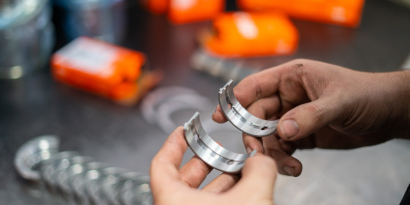Truck preventive maintenance is vital to ensure transport safety. With this in mind, below, we will present some aspects to be observed both by those on the ride and by the mechanics who carry out maintenance! Join us.
8 truck preventive maintenance tips
Many drivers still do not have this view that caring for the vehicle goes beyond the need to save money whenever possible. In fact, items such as safety, cost optimization, quality of work and even quality of life can be impacted if maintenance is neglected. So, keep an eye out for the tips we’ve separated here:
1 – Keep an eye on the filters
Changing the engine oil, fuel and air filters must be carried out strictly according to the manufacturer’s recommendations. Special attention should be given to the air filter, as heavy use can reduce the life of the part. Thus, when it is very dark, looking dirty, it is important to replace it. Neglecting this care can damage parts and increase fuel consumption!
2- Don’t forget the engine oil
And together with the oil filter it is worth checking the engine oil itself. It may be a basic warning, but the truth is that, in the rush of daily life, between one freight and another, many truckers skip this check. It is then up to the mechanic to confirm if there is a need for a change or if topping up the oil is enough.
3- Brake system is always a priority on a truck preventive maintenance
The braking system should be a reason for extra attention for any truck driver. It’s something you can’t fix: you always have to be up to date. So check that the linings or pads are not worn out. Grooves or imperfections in the surfaces are indicative of the need to change the part.
4- Keep tires within specifications
As trucks and heavy vehicles often carry large loads, the tendency is for wear to be even more accelerated than in passenger vehicles. So keep an eye out for the Tire Wear Indicator, a kind of rubber bump inside the tire’s larger grooves that indicates rubber wear.
5 – Suspension is also essential in truck preventive maintenance
Springs, stops, trays and stabilizer bar are suspension system items that need to be checked to recognize any defects in advance on a truck preventive maintenance. At the same time, it is worth checking the lubrication of the central and support pins, as well as bushings, screws, clamps, hoses and valves.
6 – Be careful with the electrical system!
A tip for checking this system is to start with the battery, after all, it provides energy for all components. Check the water and also see if there is any oxidation on this item. Then evaluate the cables and terminals, looking there also for any signs of this same problem. Make sure the fittings are all snug, eliminating any problem due to bad contact.
7 – So as not to get stuck, pay attention to the injection module
Finally, if the vehicle is equipped with electronic injection, the injection module software update must be performed according to the manufacturer’s recommendation. In parallel, evaluate all injection components – this is a care that makes a difference!
8- For all maintenance, use quality parts
Throughout this truck preventive maintenance process for the truck, it is essential to use quality parts. After all, just as important as taking these precautions in advance is choosing quality materials to ensure the safety and durability of the repair. And you know: here at RIO we have a spare parts catalog capable of guaranteeing the reliability you need and deserve.
Oh, and always remember to follow our social networks and all RIO communication channels to learn about other valuable tips for your daily life, both for car and truck maintenance. Do you want to know more? So feel free to get in touch with us or leave your comment in the space below!
We hope this article has been helpful. Enjoy and share with your colleagues so that more people know about these valuable truck preventive maintenance tips!





